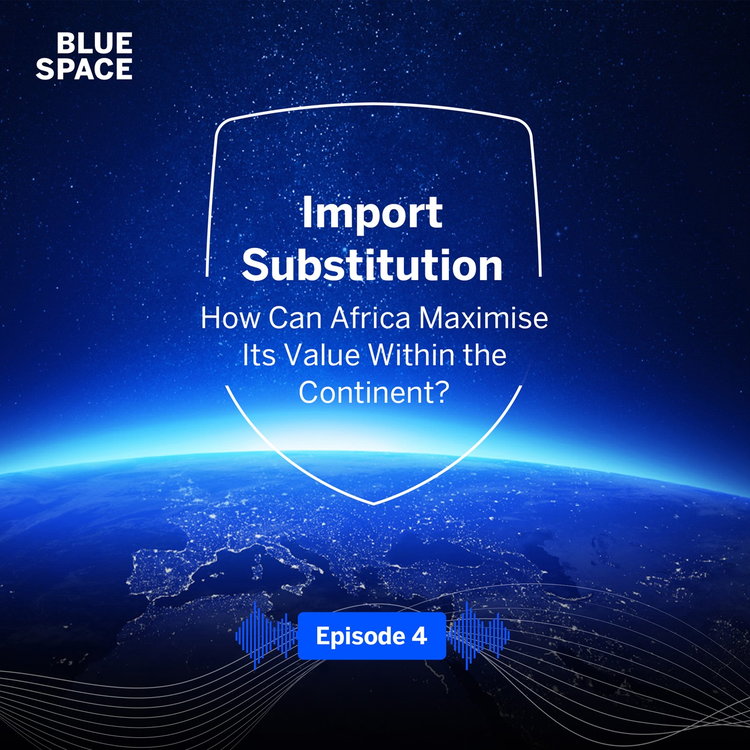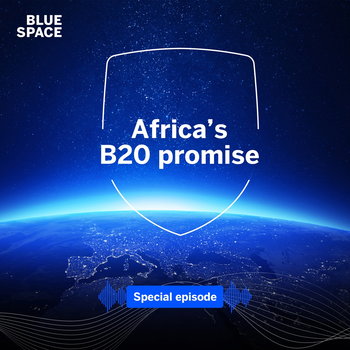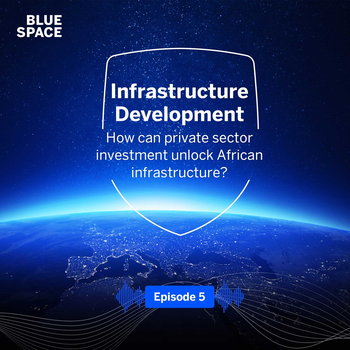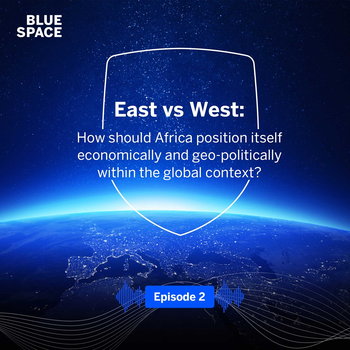00:02:
Hi, I'm Joanne Joseph.
00:03:
I'm coming to you from the Kenyan capital, Nairobi, with this latest episode of The
00:08:
Blue Space.
00:10:
Thank you for joining us.
00:12:
As you're probably aware,
00:14:
Africa ships the bulk of its raw material offshore for processing only to import the
00:18:
final product.
00:20:
So how do we keep the value right here on the continent by substituting our imports
00:25:
for local manufacturing?
00:27:
Let's find out on The Blue Space.
00:35:
My name is Anne Mugweru.
00:36:
I lead Diversified Industries and Real Estate at Stanbeck, Kenya, in the
00:42:
corporate and investment banking space.
00:44:
I'm Stefan Grabowski, and I'm the CEO of Kimpoli.
00:54:
What's on your playlist at the moment?
00:55:
Ooh.
00:57:
Podcasts.
00:59:
I do a lot of podcasts, you'll be surprised I have not so much of music.
01:03:
Tea or coffee?
01:04:
Coffee.
01:04:
Tea.
01:05:
What do you love most about your work?
01:08:
It's really seeing people grow and develop.
01:11:
What's your get up and go song?
01:12:
I like this is my fight song.
01:18:
Hello, I'm Joanne Joseph and you're in the blue space brought to you by Standard Bank
01:24:
Corporate and Investment Banking.
01:26:
This episode is being filmed in Nairobi, not far from Kenya's East African import
01:31:
and export hubs.
01:33:
Every day, Africa sends a wealth of raw materials overseas to be processed and
01:38:
converted into finished products,
01:40:
and millions of Africans are missing out on the benefits of local manufacturing.
01:44:
How can import substitution solve this?
01:47:
Well, joining me to unpack this question are Executive for Diversified Industries
01:53:
at Stanbic Bank Kenya,
01:55:
Anne Mugueru.
01:57:
And Ken Polly Manufacturers CEO, Stefan Grabowski.
01:58:
Thank you so much for being with us today, Stefan and Anne.
02:02:
So looking forward to this chat.
02:04:
And Anne, I want to start with you by defining what we're talking about here,
02:11:
this very intimidating term, import substitution.
02:13:
What is it exactly and why is it so important to Africa's development?
02:15:
So import substitution is really the enablement of developing countries to
02:21:
manufacture products in their
02:23:
country.
02:25:
It's really to empower developing countries to be self-sufficient on the
02:29:
products that they need, at least a bulk of them,
02:31:
and reduce their reliance on imported or processed raw materials.
02:34:
So import substitution is as old as the 1980s.
02:40:
It's a policy that came up when most African countries got their independence,
02:45:
and it was intended to help grow their industrialization.
02:51:
Natcha nascent industries in those countries and just give them some economic
02:56:
muscle.
02:58:
It continues to be relevant today because every country, depending on where they are
03:04:
on the economic cycle,
03:06:
still need import substitution to take the economy and the industrialization level to
03:10:
the next level.
03:12:
There's always room for growth.
03:14:
In Kenya, for instance, there's a need to maintain a good balance of trade.
03:17:
There's a need to ease pressure.
03:19:
on our foreign currency, dollar and KESA exchange rate.
03:23:
There's a need to spark GDP growth and the way to do it is to mobilize our
03:29:
industrialization sector.
03:31:
There's also a need to deepen our employment and empower our people.
03:35:
That's the growing of a nation from low income to mid income and we want to get to
03:42:
a first world with
03:44:
time.
03:46:
So it's relevant across Africa.
03:48:
So much potential here.
03:50:
And Stefan, I'm going to bring you in here because the manufacturing sector we know
03:52:
is key to driving import substitution.
03:54:
That's the space in which you play.
03:56:
So give me a sense of how the Ken Polly Group keeps its capacity in country while
04:01:
managing to stay competitive.
04:03:
We really started out purely as an import substitution company, making final
04:08:
products from imported raw materials,
04:10:
which breaks the mold a bit.
04:12:
But I also kind of think that, you know, just because you have a foothold in the
04:15:
market,
04:16:
thinking you can be comfortable is enough.
04:18:
Africa is a continent of over a billion people.
04:22:
And what we've sort of seen in Kenya is consumers are really maturing in their
04:27:
tastes.
04:28:
They're modernizing pretty rapidly.
04:29:
And so if I look at us as a company, although our core capability really
04:36:
started around the basics of importing,
04:38:
substituting what we imported products, Right now we've had to develop a bunch of
04:43:
different capabilities around design,
04:45:
engineering, you name it, so that we can serve the local market better.
04:49:
So Africa is not standing still either.
04:51:
And that's wonderful to hear and I'm sure if this were easy everybody would be doing
04:56:
it right?
04:57:
But I'm also pretty sure that you've faced a number of challenges.
05:00:
in implementing your import substitution strategy.
05:04:
Could you give us an idea of what some of those challenges might have been and how
05:07:
you overcame them?
05:09:
When you think about challenges, I think a lot depends how you frame them.
05:12:
If you are committed, committed to a place, committed to an industry, you
05:18:
really don't have a choice but to confront them.
05:20:
You can't run away from them anymore.
05:22:
And so then you really have to reframe those as opportunities.
05:24:
And the biggest opportunity that I really see is the capacity we can build in our
05:28:
people.
05:29:
Yes.
05:30:
We have machines.
05:30:
Yes, we produce products.
05:32:
But the core of that is our capability.
05:35:
And as I said before, our engineers learn here locally and our designers and our
05:42:
product people.
05:42:
Speaking at the beginning about these imports and the effect they've had
05:46:
essentially,
05:48:
but are imports necessarily all bad in inverted commas?
05:51:
I mean, is there a balance to be struck between importing what is useful while
05:57:
keeping the value in Africa?
05:59:
That's right, Joanne.
05:59:
Not all imports are bad.
06:01:
I think it's keeping a balance.
06:05:
Every country economically has to focus on the things they can do best.
06:10:
If we are an agricultural producing country or if we have certain minerals in
06:16:
our country,
06:17:
we should process them to a certain stage before we sell them raw, before we export
06:23:
them raw,
06:25:
only to import them all right back in a different...
06:26:
finished products either through our electronics or vehicles or you know other
06:30:
consumables.
06:32:
So we have to do what we can do best and we have to invest in creating some value
06:37:
even when we have to export a
06:39:
process through material or finished product.
06:41:
We do that, we started that in the tea industry, we started that in the coffee
06:43:
industry.
06:44:
What I would call bad manufacturing is or other importation is when we have to
06:50:
import all the way to toothpicks and
06:52:
napkins and tissue that we can.
06:54:
process the end product in country.
06:56:
So I think the word is keep a balance and do your best to improve your
07:03:
industrialisation in country.
07:05:
Yeah.
07:07:
I want to put this question to you now, Stefan.
07:09:
Anne's given us her take on what imports are considered bad and whether they're all
07:12:
bad across the board.
07:14:
What's your view on that?
07:16:
Yeah, my view is that imports are necessary.
07:18:
So what always needs to be in the back of our minds is...
07:22:
Where can we actually build that local capability, that local competitiveness,
07:27:
that ultimately allows us to not only replace those imports, but go beyond our
07:34:
borders and bring income into the country?
07:36:
Let someone else import our products too.
07:38:
The goal ultimately must be that import substitution is the starting point,
07:41:
which allows us to build capability here, and that does require some government
07:48:
policy settings that are appropriate to that.
07:50:
But ultimately...
07:52:
It shouldn't be something that businesses hide behind either.
07:53:
I think if we are overprotected, we never develop that competitiveness that we
07:59:
really need to go beyond that.
08:01:
So this coordination between public, the government, and the private sector, I
08:05:
think is absolutely critical.
08:07:
I couldn't agree more.
08:09:
Stefan, there's something that I need to ask, because there's a great deal of
08:13:
environmental concern around single-use
08:15:
plastics.
08:17:
You're deeply entrenched in that industry, and people are really worried.
08:18:
about the growth of the plastics industry and essentially the impact it will have
08:25:
environmentally in the decades
08:27:
and in fact even longer than that to come.
08:28:
So we're in the durable space, so there's not a single item that we produce which is
08:33:
single use.
08:34:
And really the way that we see that is the more appealing that we can make our
08:38:
products,
08:38:
the longer they stay in people's homes and out of the waste cycle.
08:42:
But on the other end of that, we already have a significant amount of
08:46:
waste volume coming back to us from our existing customers and we can use that in
08:52:
our production.
08:52:
In fact they return waste plastic to us and we're able to process that and then
08:58:
reuse it in our manufacturing
09:00:
and in fact we really like doing that.
09:02:
Leave the environmental impact to one side there's actually a significant cost
09:08:
advantage and you know what's important
09:10:
is just still giving consumers at the end of the day a product that they're really
09:15:
happy with and the content of that product.
09:17:
You know, that's where our engineers come in and really try to figure that out.
09:18:
Well, that's really good to know, Stefan.
09:20:
Anything you want to add to that, Anne?
09:22:
Thanks, Joanne, but very well said.
09:25:
I think what I'll just resound is creating awareness that, you know,
09:30:
the thinking is that plastic is synonymous to, you know, environmental negative
09:36:
impact,
09:38:
but there's a lot of recycling, as Stefan has already said, and that's why we
09:44:
support partners like...
09:46:
Like Stefan, like Ken Polly and others that do durable plastics, recyclable
09:51:
plastics,
09:53:
and they do get waste plastics from the environment, which as he explained is
10:00:
already recycled.
10:00:
into products that are not very sensitive to virgin plastic.
10:05:
Yeah, I mean, one has to think about the environmental and social impact, right,
10:09:
Stefan?
10:11:
What would you say, when you look at those words, import substitution and impact,
10:15:
what springs to mind?
10:17:
The first thing that really comes to me is the employment impact.
10:21:
You know, we've spoken a lot about the macros, but I think if you look on the
10:27:
ground, what does that mean?
10:29:
Thousands and thousands of people.
10:31:
you know parents couples people with ambitions people who want to move their
10:36:
lives forward as well and
10:38:
so the immediate impact is employment and everything that comes with that in terms
10:44:
of a healthy society does any such story
10:46:
spring to mind for you ann maybe
10:46:
i'll not talk about just one story but i've seen a community transform i've seen
10:52:
an industry
10:54:
built from scratch where it was just bare land they came and bought the land because
10:58:
they needed to expand
11:00:
and then it made sense for them to source local labor.
11:03:
You know, people who stay within the vicinity and can report to work by 8 a.m.,
11:09:
can leave if they need to leave by
11:11:
5, 30 or 6, or if they need to come for the night shift.
11:13:
So you really need to tap into the community around that area.
11:18:
And because the place was not developed, it was quite unsafe to drive, I think,
11:22:
past 6.
11:24:
There were a lot of Shlesi small traders on the streets.
11:28:
and crime was infiltrating because of that setup.
11:33:
There were a lot of, you know,
11:36:
just say a community of people living in abject poverty.
11:43:
But since this factory came up and they needed physical manpower,
11:49:
they had a preference for women.
11:51:
And they did this because that's the most vulnerable segment of the community.
11:56:
And a lot of the people I talked about who are, you know, really sometimes even
12:01:
begging on the streets were women.
12:03:
And you could see they have children on their backs.
12:07:
And they got working into this company because they got some, you know, source of
12:12:
income.
12:13:
The company provides them food.
12:15:
I think it's two meals a day.
12:18:
They have a program where sometimes, you know, their children can come play
12:24:
football in the part of the company.
12:26:
land that's not developed and of course there's a lot of mentorship that goes to
12:31:
the young mothers and and their
12:33:
children encouraging them to to you know educate their children and so on the whole
12:38:
place has totally transformed well i can't
12:40:
wait to visit you both again and hopefully we will do an episode in the future in
12:46:
which you tell me how it's come along by leaps and bounds
12:48:
and how import substitution has become the watchword of the day thank you both for
12:52:
that and that is where we will leave it
12:54:
for today, Executive for Diversified Industries at Stanbic Bank, Kenya and
12:57:
Mugueru,
12:58:
and CEO of Ken Polly Manufacturers, Stefan Grabowski.
13:01:
Thank you so much for joining us.
13:03:
Lovely to have your fascinating insights into this issue.
13:05:
I'm Joanne Joseph, and this has been another episode of The Blue Space,
13:09:
brought to you by Standard Bank Corporate and Investment Banking.
13:13:
Take care.
13:14:
Bye-bye for now.
13:15:
Visit www.standardbank.com forward slash blue space to find out more about The Blue
13:21:
Space.






